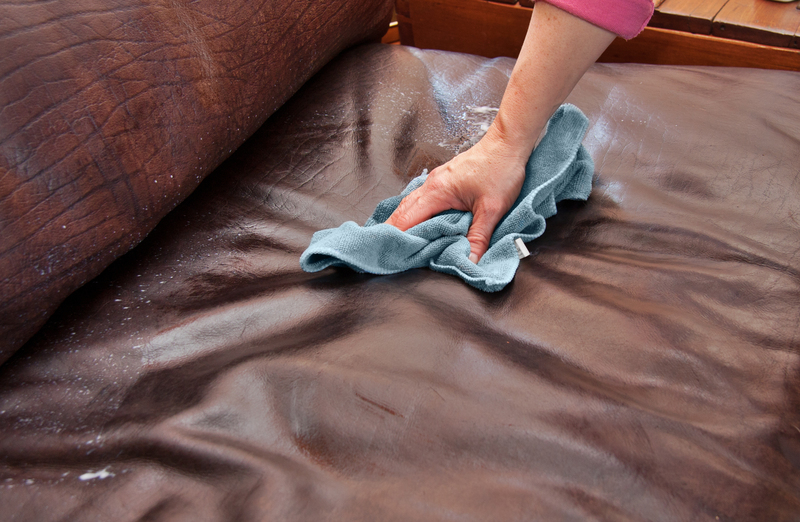Protecting Health Through Superior Air Quality in Home and Work
Posted on 26/08/2025
Protecting Health Through Superior Air Quality in Home and Work
Superior air quality is essential in safeguarding our health, both within the comforting walls of our homes and the bustling environments of our workplaces. While air pollution's detrimental effects are widely acknowledged outdoors, it's the unseen contaminants inside our living and working spaces that often pose the greatest threats. In this comprehensive guide, we will explore the importance of superior indoor air quality (IAQ), what jeopardizes it, and how you can take actionable steps to ensure that the air you breathe is safe, clean, and truly health-protective.
Understanding Indoor Air Quality and Its Impact on Health
When we think of air pollution, many of us imagine hazy city scenes or smog-filled industrial areas. However, studies from the Environmental Protection Agency (EPA) have revealed that the air inside buildings can be two to five times, or even up to one hundred times, more polluted than the air outside--making superior air quality at home and work an absolute necessity for our well-being.
What is Indoor Air Quality?
Indoor Air Quality (IAQ) refers to the condition of the air within and around buildings, especially concerning the health and comfort of the occupants. IAQ is determined by a combination of factors such as pollutants, humidity, ventilation, and temperature.
Health Effects of Poor Air Quality
- Respiratory Problems: Poor indoor air can lead to allergies, asthma, bronchitis, and aggravate existing lung conditions.
- Allergic Reactions: Pollutants like mold, pollen, and dust mites can trigger sneezing, runny noses, and itchy eyes.
- Serious Illnesses: Prolonged exposure to toxic substances such as radon, asbestos, or secondhand smoke may cause cancer, heart disease, or neurological disorders.
- Reduced Productivity and Cognitive Performance: Studies have shown that poor air quality can lower concentration, decrease energy, and increase absenteeism in workplaces.
Clearly, protecting your health through superior air quality is not just a matter of comfort--it's essential for longevity and quality of life.

Common Indoor Air Pollutants and Their Sources
Understanding the variety of pollutants that can negatively impact indoor air quality at home and work is the first step toward achieving a healthier environment. The primary sources of contaminants include:
- Biological Pollutants: These include mold, bacteria, viruses, pet dander, dust mites, and pollen, which thrive in humid or dirty environments.
- Chemical Pollutants: Volatile organic compounds (VOCs) from cleaning supplies, paints, pesticides, and synthetic materials. Carbon monoxide, formaldehyde, and radon are particularly hazardous yet often undetectable without testing.
- Particulate Matter: This includes fine particles from combustion (like tobacco smoke and cooking), as well as dust which can accumulate from both outdoor and indoor sources.
- Outdoor Pollutants: Substances such as pollen, industrial emissions, and vehicle exhaust can enter buildings and contribute negatively to IAQ.
Why is Superior Air Quality Especially Crucial at Home and Work?
We spend nearly 90% of our time indoors, either at home or in our workplaces. This means optimal air quality in these environments is vital. For children, the elderly, and those with preexisting health conditions, the risks are even greater.
Key Benefits of Superior Air Quality for Health
Investing in superior indoor air quality yields a multitude of benefits beyond disease prevention. Here's why you should prioritize it in your daily living and working environments:
- Reduces Allergic and Asthmatic Symptoms: Superior IAQ reduces exposure to triggers.
- Boosts Immune Function: Clean air enhances respiratory health, empowering the immune system to fight infections more effectively.
- Improves Sleep Quality: Breathing clean air, especially free of particulates, can result in deeper, more restorative sleep.
- Enhances Mental Clarity: Oxygen-rich, pollutant-free air increases focus and productivity.
- Promotes Overall Wellbeing: Superior air quality supports physical, mental, and emotional health--every breath counts!
Effective Ways to Achieve Superior Air Quality at Home and Work
1. Regular Ventilation is Key
Proper ventilation is the foundation for health-protective air quality. This can be as simple as opening windows regularly to let fresh air circulate and dilute indoor pollutants. In areas where outdoor air quality is poor, consider mechanical ventilation systems with HEPA filters.
2. Adopting Air Purification Technologies
There are several options for improving indoor air quality through purification systems:
- HEPA Air Purifiers: These devices capture 99.97% of airborne particles down to 0.3 microns, including dust, allergens, and mold spores.
- Activated Carbon Filters: Effective for removing odors and VOCs from the air.
- UV Air Sanitizers: Using ultraviolet light to kill bacteria and viruses, supplementing filter-based systems.
- Whole-House HVAC Systems: For large homes or office spaces, integrated air cleaning and filtration protect everyone inside.
3. Control Humidity Levels
Proper humidity control (ideally between 30-50%) is essential. High humidity promotes mold and dust mite growth, while low humidity can worsen respiratory conditions. Dehumidifiers or humidifiers can help maintain ideal levels for superior indoor air quality.
4. Minimize Use of Chemicals Indoors
Choose non-toxic, low-VOC products for cleaning, painting, and building. Store household chemicals safely away from living areas. Whenever possible, use natural alternatives such as vinegar, baking soda, and lemon.
5. Regular Cleaning and Maintenance
A clean space is a healthy space. Regular dusting, vacuuming with HEPA-filter vacuums, and washing textiles like curtains and bedding can significantly cut down on allergens and dust.
6. Houseplants: Nature's Air Filters?
Certain indoor plants, such as spider plants, snake plants, and peace lilies, can absorb toxins and produce oxygen. While beneficial, plants should complement--not replace--ventilation and mechanical air purification.
Designing a Healthy Home and Work Environment
Selecting the Right Materials
When renovating or constructing new spaces, prioritize materials that contribute to good indoor air quality. Opt for hardwood, tile, or linoleum flooring instead of carpeting, which can trap dust and allergens. Choose paints and adhesives with low or no VOC content.
Creating Air-Quality Friendly Workspaces
- Keep work areas uncluttered: Reduce dust accumulation.
- Introduce green zones: Strategically place air-purifying plants.
- Maintain a no-smoking policy: Smoking indoors is a leading cause of unhealthy air quality in workplaces.
- Encourage regular breaks outdoors: Providing employees with access to fresh air boosts wellbeing.
Monitoring and Testing Indoor Air Quality
You can't manage what you don't measure. Invest in indoor air quality monitors to keep tabs on potentially hazardous pollutants like carbon monoxide, CO2, particulate matter, VOCs, and humidity. At least once yearly, schedule a professional assessment, especially if you suspect issues such as radon or mold.
Steps for Routine Air Quality Checks
- Install CO and smoke detectors in key areas.
- Use digital indoor air quality monitors for real-time readings.
- At home, check for musty odors or visible mold, which may suggest hidden issues.
- In offices, ensure HVAC filters are changed at least quarterly.
Addressing Special Considerations and At-Risk Groups
Health-Compromised Individuals
Those with asthma, allergies, heart conditions, or weakened immune systems are most impacted by indoor air quality. Homes and workplaces with infants, seniors, or people with chronic illnesses should take extra steps in monitoring and maintaining superior air quality.
Pet Owners
Pets shed dander and bring in outdoor contaminants. Groom pets regularly, vacuum often, and change air filters at higher frequencies to mitigate adverse effects.
Superior Air Quality: The Workplace Advantage
Corporate Responsibility and Employee Health
Businesses play a crucial role in protecting employee health through optimized air quality. Superior air reduces sick days, enhances mental acuity, and ensures compliance with Occupational Safety and Health Administration (OSHA) standards. Moreover, a healthy workplace environment reflects a commitment to corporate social responsibility, making employers more attractive to top talent.
Simple Steps for Workplaces
- Install high-efficiency filtration in central HVAC systems.
- Promote a fragrance-free policy to reduce chemical sensitivity.
- Educate employees about the benefits of indoor air quality using clear signage and newsletters.

The Future of Air Quality Protection: Smart Tools and Innovations
Thanks to rapid advances in technology, maintaining superior air quality at home and in workplaces is easier and more effective than ever. Some innovations leading the charge include:
- Smart Sensors: Provide real-time data and can trigger air purification responses automatically.
- IoT Integration: Air quality monitors that link with home automation systems to optimize ventilation and filtration.
- Advanced Filtration Materials: Next-generation HEPA, activated carbon, and photocatalytic filters target an ever-broadening array of contaminants.
- Green Building Certifications: LEED, WELL, and other guidelines now prominently feature strong air quality criteria.
Conclusion: Make Every Breath Count
The significance of protecting health through superior air quality at home and work cannot be overstated. Whether you're a homeowner or a business leader, prioritizing the air you and your family, employees, or colleagues breathe is a true investment in long-term health and productivity. By understanding pollutants, adopting modern technologies, and practicing proven routines, you can ensure a healthier environment--making every breath you take both safe and revitalizing.
Take action today: assess your current indoor air quality, implement these best practices, and experience the profound difference that superior air can make in your life and work!




